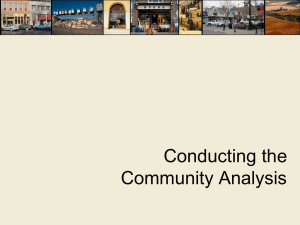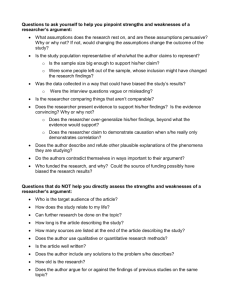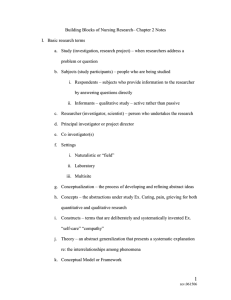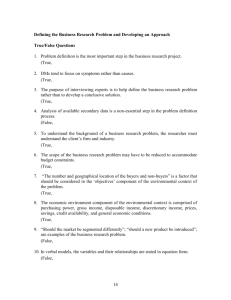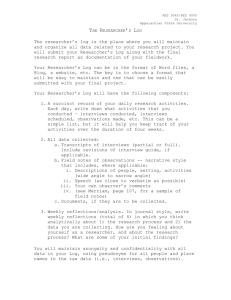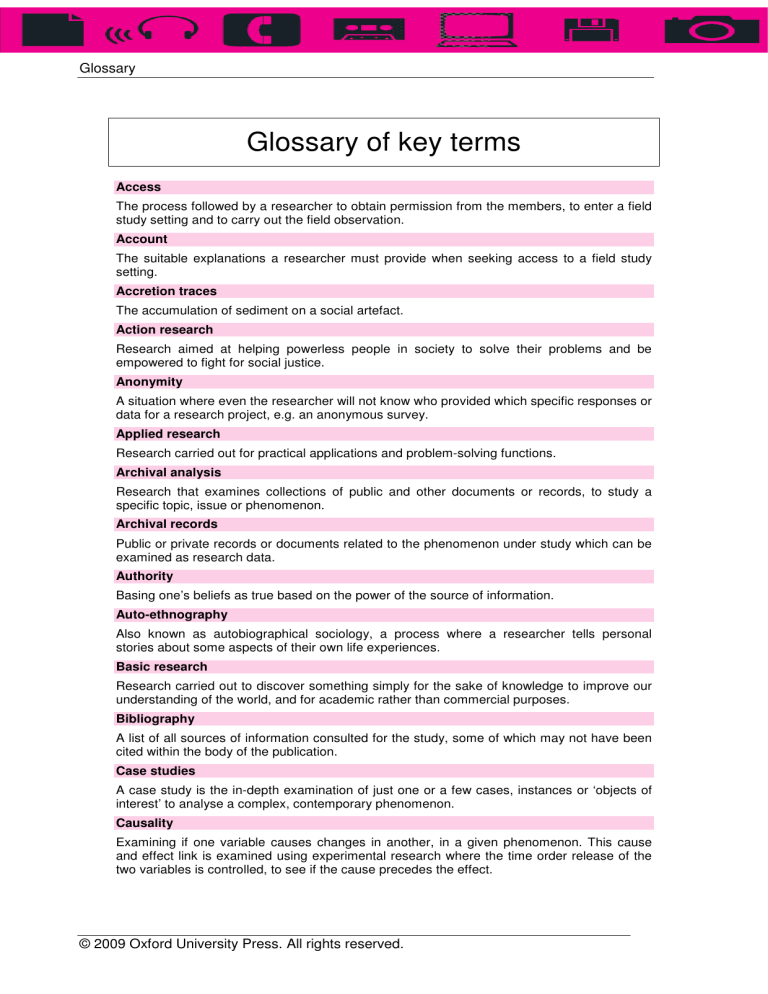
Glossary
Glossary of key terms
Access
The process followed by a researcher to obtain permission from the members, to enter a field
study setting and to carry out the field observation.
Account
The suitable explanations a researcher must provide when seeking access to a field study
setting.
Accretion traces
The accumulation of sediment on a social artefact.
Action research
Research aimed at helping powerless people in society to solve their problems and be
empowered to fight for social justice.
Anonymity
A situation where even the researcher will not know who provided which specific responses or
data for a research project, e.g. an anonymous survey.
Applied research
Research carried out for practical applications and problem-solving functions.
Archival analysis
Research that examines collections of public and other documents or records, to study a
specific topic, issue or phenomenon.
Archival records
Public or private records or documents related to the phenomenon under study which can be
examined as research data.
Authority
Basing one’s beliefs as true based on the power of the source of information.
Auto-ethnography
Also known as autobiographical sociology, a process where a researcher tells personal
stories about some aspects of their own life experiences.
Basic research
Research carried out to discover something simply for the sake of knowledge to improve our
understanding of the world, and for academic rather than commercial purposes.
Bibliography
A list of all sources of information consulted for the study, some of which may not have been
cited within the body of the publication.
Case studies
A case study is the in-depth examination of just one or a few cases, instances or ‘objects of
interest’ to analyse a complex, contemporary phenomenon.
Causality
Examining if one variable causes changes in another, in a given phenomenon. This cause
and effect link is examined using experimental research where the time order release of the
two variables is controlled, to see if the cause precedes the effect.
© 2009 Oxford University Press. All rights reserved.
Glossary
Census
A sample that includes every member of the targeted population of the research study.
Closed system
A system that is unaffected by external factors or the environment as it cannot interact or be
influenced by them.
Cohort studies
Examines different samples of a specific sub-population or cohort across time to examine
how they may have changed during that period.
Columbia School
Related to the functionalist paradigm, research under this school of thought looks at how
things may be improved by looking at how and why people do things a certain way and how
they work. It is also known as administrative research.
Common sense theories
Theories based on what we know to be true from experience, which can be scientifically
proven.
Concealment
A situation where some information about the project is kept hidden from the participants or
respondents.
Concept
A name or label given to a specific phenomenon, which is easily recognisable and
distinguishable.
Confederates
A person working for or with the researcher who is instructed to act in a certain way as
designed in the study to examine how participants react to it.
Confidentiality
A situation where the identities of the respondents are protected and not made pubic by the
researcher.
Connotation
The implied meanings of a sign/message/text.
Constructionism
The epistemology which assumes that there is no one absolute truth or ‘reality’ and that
reality is socially constructed. It is most often used in qualitative research and the
interpretivist paradigm.
Constructivism
A theory about how people learn – where they ask questions and find answers via exploration
and assessment of what they already know.
Constructs
Since concepts are abstract and unobservable, they need to be assigned a specifically
created construct for a given research project that carries a specific meaning within that
context.
Content analysis
A quantitative research method used to analyse the manifest content (literal meaning) of
messages in a systematic and objective manner to measure and compare their various
characteristics.
Convenience or availability sample
A sample made up of readily available subjects used in a research study.
© 2009 Oxford University Press. All rights reserved.
Glossary
Correlations
Interdependence between factors within a system.
Cost-benefit analysis
An analysis that explores how to reach the desired goal at the lowest cost or in the most
efficient manner.
Covering laws
Theories that are expected to apply or ‘cover’ the broadest possible number of similar issues,
events or phenomena under study (generalisability) in a given research project.
Covert participant observation
A field study where the members or its leaders are aware of the researcher’s presence and
where the researcher openly carries out the observation, note taking, interviews etc.
Critical theory
Research carried out under this paradigm examines the ideologies and power relations in
society or a given situation pointing out what is wrong or unfair, who benefits from the current
situation and tries to make positive changes to benefit everyone – especially those who are
powerless, marginalised and negatively affected. It is related to the Frankfurt School.
Cross-sectional study
A one-off study conducted using a representative sample from the relevant population. It
provides a snapshot of the present with findings that are limited in scope.
Cultural studies
This perspective is also credited to the Birmingham school. It looks at ‘representation’ or how
meanings are given to different things depicted in a text. It also looks at how the same text
may be ‘read’ or interpreted in different ways by different people, how it works and in what
contexts.
Curvilinear relationship
A graph plotted between the independent and dependent variables indicates a U-shaped
curve. As the value of one decreases, the value of the other also decreases to a point but
thereafter, as one increases, the other also increases. This process is reversed in an inverted
(upside down) U-shaped curve.
Debriefing
In situations where deception or concealment has taken place in a research study, the
researcher must reveal the true nature of the study at the end of the data collection.
Deception
A researcher deliberately providing false information to research participants or respondents.
Deductive reasoning
An approach to research where the researcher predicts a relationship between the
independent and dependent variables, stating it as a hypothesis. The hypothesis is then
tested to see if it is true or false. Comes under the logic of reasoning.
Denotation
The literal meaning of a sign/message/ text.
Dependent variable
The variable the researcher seeks to explain. These are always measured or observed – not
manipulated.
Depth interviews
A method of qualitative data collection used when the phenomenon under study cannot be
directly observed or measured. Interviewers will ask people for their opinions, views,
experiences, recollections, feelings etc. on the topic, issue or phenomenon under study.
© 2009 Oxford University Press. All rights reserved.
Glossary
Descriptive studies
A study where the researcher provides a description of their observations, findings, results of
data analyses, what people said during interviews etc. of a phenomenon under study.
Discourse analysis
A method of data analysis used to examine how a topic or subject gets ‘talked about’ in
society and in media messages, to uncover the power relations embedded in society.
Dynamic equilibrium
A system stays in balance, or equilibrium, while its various parts move or remain active
(dynamic) all the time.
Ecological fallacy
Making inferences about a group and applying them to all individuals belonging to that group
irrespective of their individual differences. Similar to profiling or stereotyping.
Empiricism
A theory that sees all knowledge as derived from sensory experience.
Epistemology
A way of understanding and explaining how we know what we know or believe in.
Erosion traces
Involves wear and tear and some form of reduction of a social artefact.
Ethnography
A qualitative research methodology used to observe people in their natural and uncontrolled
social and cultural settings.
Evaluation research
Research carried out to gauge the relevance, suitability and effectiveness of a specific (public
relations or other) campaign or program, being implemented. It is also known as program
evaluation.
Exit strategy
The plan set in place to leave a field study setting at the end of the data collection. This
should include debriefing, if any form of deception was involved.
Experimental research
A research methodology used to examine the behaviour of people in controlled settings.
Explanatory studies
The researcher provides a causal explanation of ‘why it is so?’ or a functional explanation of
‘how is it so?’ for a phenomenon under study.
Exploratory studies
Preliminary research that explores a relatively new or unknown topic to gain a basic
understanding of it, but not to provide satisfactory answers to a research question.
External validity
The generalisability of research findings to those other than the sample or population used in
the study.
Fallacies
Wrong assumptions made in research.
Field notes
A researcher’s notes on the observations made at the setting during a field study.
Field study
A qualitative data collection method borrowed from anthropology, also known as field
observation. It is carried out in the natural setting where the phenomenon takes place.
© 2009 Oxford University Press. All rights reserved.
Glossary
Focus groups
A qualitative data collection method using a group interview of 6-12 people to gather their
opinion on a specific social/political/environmental issue.
Framing
The way the messages of a discourse are regulated and controlled, that shapes how the
message is interpreted.
Frankfurt school
Linked to the critical theory paradigm and the theories of Karl Marx.
Functionalism
Research carried under the functionalist paradigm examines why people behave the way they
do and assumes it is because people know the consequences and uses (functions) of their
behaviour or actions. It is also known as administrative research and is linked to the
Columbia School.
Genre analysis
A method of analysing texts classified according to the distinct categories or genres they
belong to based on their structures and subject matter. It is a method of qualitative content
analysis of the latent or hidden aspects of messages.
Grounded theory
A systematic method of analysing qualitative data.
Hermeneutics
The study of understanding human action and text.
Heuristic value
Indicates if a theory can generate research and take our knowledge further.
Hypothesis
A formal statement made about the predicted relationship between variables in a research
study, which is directly tested by the researcher. Generally linked to deductive reasoning.
Ideographic explanations
Only valid for a specific situation or ‘case’ and not generalisable to others.
Ideological analysis
Ideology is a representation of a shared value or belief held by a group or society. A
researcher will examine the specific beliefs or ideologies of a culture that are revealed in the
signs and texts its society uses and creates.
Independent variable
The variable that is systematically changed or manipulated by the researcher, which creates
changes in the dependent variable. These are measured and observed or manipulated.
Individual fallacy
Taking an exception to a general rule and considering it as cancelling the rule.
Inductive reasoning
The researcher begins with an open mind looking at the full picture to see what is going on. It
uses research questions and comes under the logic of reasoning.
Informants
A person who helps a researcher in a field study by helping them gain access to the setting,
introduce them to the members of the setting, answer questions the researcher may have and
provide clarifications. Often it is a member of the setting.
Interactions
Factors that influence each other within a system.
© 2009 Oxford University Press. All rights reserved.
Glossary
Inter-coder reliability
Recoding of (randomly selected) 10% of the units of analysis coded by one coder, by another
in a content analysis, to examine the agreement between the two for reliability and
consistency.
Interpretivism
The theoretical paradigm where research seeks knowledge through the interpretation or
understanding of human action, by examining how people make meanings of them.
Interrelationships
Relationships between factors within a system.
Intertextuality
A new text borrowing aspects from or making references to existing ones.
Interval level variables
Variable categories which carry names or labels indicating some rank order, have equal
distances between adjacent categories, but have no true zero.
Intracoder reliability
In a content analysis when only one person carried out all the coding, 10% of the units of
analysis are randomly selected and recoded by the same person at a later stage to examine
the agreement between them, for reliability and consistency.
Intuition
Seeing truth as obvious, self-evident or based on commonsense knowledge.
Life histories
Research that examines the entire chronological life history of a person, by interviewing a few
people to gain insights into the person whose life history is examined.
Likert scale
Also known as the summated ratings approach, a Likert scale has several statements that
address the concept under examination with an interval scale, prepared by the researcher.
The numbers given by a respondent to each of the statements on the interval scale are added
to obtain a composite score.
Linear relationship
A situation where one or more of the dependent variables will change when the independent
variable changes.
Literature review
An examination of the existing research publications on the topic area of a new study, to
discuss their theorising, research designs, data collection methods, findings, strengths,
limitations and contexts as relevant to the new one. This also includes the researcher’s own
views and observations, and alternative explanations of the findings as to what other factors
may have given rise to those findings.
Logical fallacy
A researcher fails to correctly identify the relevant unit of analysis in a study, leading to
confusion, inaccurate conclusions and research findings.
Longitudinal study
A study that collects data from the same population (but different samples) at different points
in time.
Mean
Also known as the ‘average’, it is the median of a set of values.
Measurement
The way data are collected and observations made for a given concept or variable.
© 2009 Oxford University Press. All rights reserved.
Glossary
Measurement error
Errors in the findings caused by the shortcomings of the research instrument used to collect
the data.
Median
The mid-point of a set of values, when they are arranged in ascending or descending order.
Methodological triangulation
Use of several methods of data collection in the same research project to obtain several
perspectives of the same phenomenon.
Methodologies
The strategic plan of action, process or design used in a research study, e.g. experimental
research, ethnography.
Methods
The various data collection and analysis techniques, practices and procedures followed in
research, e.g. survey questionnaires, focus groups.
Mode
The value that occurs most often in a distribution of values for a given variable.
Moderator
The person conducting a focus group.
Multi-method research
Research that uses more than one paradigm, methodological tool or data collection method in
the same study to obtain a more holistic view.
Multivariate analysis
A study which has more than one independent variable or several dependent variables under
analysis.
Narrative analysis
Describes the formal narrative (story telling) structure of a message and is a form of
qualitative content analysis of latent messages.
Needs assessment
An analysis that identifies potential problem areas, their severity and how they may be
addressed.
Negative relationship
When the value of the independent variable increases, the value of the dependent variable
decreases.
Nominal level variables
Variable categories, which are simply given names or labels.
Nomothetic explanations
Allows for generalised explanations rather than unique or idiosyncratic ones. Often used in
positivist research.
Non-linear relationship
A situation where no predictable pattern or relationship seems to exist between the
independent and dependent variable in the phenomenon.
Non-participant observation
A field study where the researcher does not take part in the activities of the setting being
observed or studied.
© 2009 Oxford University Press. All rights reserved.
Glossary
Non-probability sampling
A sample where each member or unit in the study population does not have an equal chance
of being selected.
Non-representative sample
A sample that does not include cases or individuals from all subgroups of the targeted
population. Findings of such as study are not generalisable to the population.
Non-response rate
The percentage of the respondents that did not answer a specific question.
Non-scholarly sources
Newspapers, magazines, trade journals, websites and other sources examined for suitable
articles and information for a research study.
Normative theories
Scholarly theories that suggest ways to improve everyday or professional practice.
Object
The event, thing or phenomenon under study.
Objectivism
An epistemology based on belief in the existence of an absolute or objective truth and reality.
Objectivity
An objective researcher is assumed to be free of individual views, biases and prejudices
during the research process.
Open system
A system that responds to and is affected by external factors or its environment.
Operational definitions
The procedure followed in measuring, observing or experiencing a variable or construct.
Ordinal level variables
Variable categories which carry names or labels but which indicate some rank order.
Overt participant observation
A field study where the members or its leaders are not aware of the researcher’s purpose and
the researcher carries out the field study undercover or while pretending to be doing
something else.
Panel studies
The same sample of subjects is studied at regular intervals to observe changes over time
within the sample and subjects.
Paradigm
A paradigm is a way or framework of looking at something.
Participant observation
A field study where the researcher does take part in the activities of the setting being
observed or studied.
Participatory action research (PAR)
Action research has a problem-solving function for social justice to benefit people who are
powerless or marginalised. Participatory action research involves community members as coparticipants to make their own decisions and take action, to improve their own lives.
Pattern coding
A method of analysing qualitative data using a systematic set of procedures to code data into
named categories (groups) to discover patterns between them.
© 2009 Oxford University Press. All rights reserved.
Glossary
Personal theories
Personal theories are subjective, culture-bound and often privately held beliefs, developed by
individuals for use in their everyday communication, e.g. superstitions, prejudices.
Phenomenology
The study of how people experience the world.
Physical traces
Some social artefacts are physical traces which can be erosion (reduced) or accretion
(collected).
Polysemy
Multiple meanings of the same message made by the ‘readers’ of the message or text.
Population
All members of a group, case or class of subjects, variables or phenomena under study.
Positive relationship
When the value of the independent variable increases, the value of the dependent variable
also increases.
Positivism
The theoretical paradigm that seeks to obtain knowledge by discovery. It uses the
epistemology of objectivism and data collection via empirical observation using the five
senses.
Postmodernism
th
An artistic movement, time in history and a style of criticism since the late 20 century.
Commonly seen in the deliberate mixing of existing texts, artistic styles, genres and media,
when creating new texts.
Poststructuralism
Relates to the phenomenon of a message having several different meanings for its different
receivers.
Primary sources
Scholarly publications written by those who conducted the research. Generally published as
journal articles, books etc.
Probability sampling
A sample where each member or unit in the study population has an equal chance of being
selected.
Process evaluation
A research method that determines if a program or campaign was implemented as designed.
Purposive sample
A sample made up of cases or individuals who meet the requirements of the study’s design
and possess the required characteristics.
Qualitative
Data that is non-numerical and embedded in their context. e.g. responses to open ended
questions in a survey; opinions of people.
Quantitative
Data that is numerical and can be ‘counted’. E.g. responses to close-ended questions in a
survey.
Quota sample
A sample that selects subjects to include known or pre-determined percentages (quotas) of
people from various groups, based on their actual distribution in the population.
© 2009 Oxford University Press. All rights reserved.
Glossary
Random digit dialling
When choosing a sample of telephone households to call for a research study, randomly
selecting the last digits set aside for home phone numbers for a given state, city and
exchange, and using random number tables to do so.
Random error
Errors in the findings caused by unexpected, uncontrolled and unknown factors.
Ratio level variables
Variable categories which carry names or labels, indicate some rank order, have equal
distances between adjacent categories, and have a true zero.
Rationale
The researcher’s explanation as to why the study is important, what purpose it serves and
what will be its outcome to society or the academic field.
Reference list
A list of all sources of information used in writing-up the research findings and cited within the
body of the publication. Listed under authors’ last names in alphabetical order.
Reliability
The consistency of the findings when the study is repeated at different times or by different
researchers, using the same methods and procedures.
Representative sample
A sample that includes cases or individuals from all subgroups of the targeted population.
Research case study
A report of a research study, based on actual research and written in the style of a standard
research report.
Research questions
Used when the researcher is not sure what to look for. It indicates the general areas of the
phenomenon under study. Data is then collected to examine the research questions.
Generally linked to inductive reasoning.
Response rate
The percentage of the sample that returned the completed surveys.
Sample
A selected number of individual cases or research subjects, drawn from a larger population
for a specific study.
Sampling error
Errors in the findings caused by differences between the sample and the targeted population.
Sampling frame
A complete list of all members of the target population.
Scholarly theories
Social scientific theories developed using scholarly research, systematic observation, inquiry,
analysis, generalisation, and prediction.
Science
Knowledge based on objective principles and systematic observation.
Scope
Indicates how comprehensive, inclusive or general a theory is to explain a range of situations
rather than just one.
© 2009 Oxford University Press. All rights reserved.
Glossary
Screener questions
The set of questions used when selecting suitable participants for a focus group, based on
the requirements of the research design.
Secondary sources
Summaries of existing research, literature reviews, analyses, commentaries, opinions,
textbooks etc written by those who did not carry out the original research. Helps identify the
key research studies, theories and scholars in the area.
Self-reflexivity
Looking at ourselves through other people’s eyes, as when looking through a mirror.
Semantic differential scales
Also known as the bipolar ratings system, it is used to measure respondents’ attitudes
towards a given issue, on a 1–7 interval scale with several opinions set up at extreme ends
(e.g. useful–useless). A composite score is calculated for each respondent for this scale.
Semiotic analysis
A method textual analysis or qualitative content analysis of latent messages, where the
researcher looks for a ‘deeper meaning’ in texts, by examining the relationships between
signs (signifier) and meanings (signified) and the use of binary oppositions (good vs bad) to
create specific meanings. It is also known as structural analysis.
Simple random sampling
A sample where each subject in the population has an equal chance of being selected for the
study.
Snowball sample
Also known as referrals, the sample is made up of referrals from subjects who identified other
suitable subjects, usually in areas that are difficult to conduct research in.
Social artefacts
A product of people and their activities or behaviours. They can serve as a unit of analysis.
SPSS
‘Statistical package for the Social Sciences’: the computer software commonly used in the
quantitative analysis of data.
Stimulus materials
Audio-visual materials related to the research topic shown to a focus group before the
discussion begins, to provide a common ground to initiate the discussions.
Subject
The person or researcher carrying out the act of meaning-making.
Subjectivism
This epistemology sees meaning-making as carried out exclusively by the active subject
(person) about a passive object (what is made meaning of). The subject will import meaning
on the object from elsewhere.
Survey questionnaire
A method of collecting data or information from people about their demographic
characteristics, opinions, choices, preferences, attitudes, beliefs, motivations etc to answer
the question ‘What do people think, do or feel about a specific issue or topic?’. They collect
quantitative data from closed-ended questions and qualitative data using open-ended
questions (by picking the applicable response).
Symbolic interactionism
The study of structure, functions and meanings of symbol systems (such as language).
Developed by the Chicago school. Uses the methodologies of ethnography and grounded
theory.
© 2009 Oxford University Press. All rights reserved.
Glossary
Synergies
Factors working together indicating that the ‘system’ or ‘whole’ is greater than the sum of its
parts.
Systems of logic
Deductive and inductive systems of logic in scientific reasoning are used in research studies
when examining an unknown phenomenon.
Systems theory
The theoretical paradigm that sees an individual, group, organisation, society or any social
entity as an ‘organism’ made of a system of parts making up a ‘whole’ that tries to maintain a
state of equilibrium or balance.
Teaching case study
A report of a research study which may be based on an actual case study but may contain
some fictional or semi-fictional aspects and is written as a story. It could also be a completely
fictional one.
Tenacity
Long-held, taken-for-granted beliefs, which are difficult to change even when faced with
contradictory evidence.
Textual analysis
A qualitative research method used to analyse the latent content (implied or hidden meaning)
of messages.
Theoretical perspectives
Provides a context to a specific research study.
Theory
A theory is used to explain what happens in society and what we do in practice. It describes,
explains and predicts a phenomenon in order to help us understand it and thereby provide
insights as to how it may be controlled.
Trend studies
A topic is re-examined or re-studied at different points in time using different samples of the
same populations to observe if any trends exist.
Unit of analysis
The unit of observation can be an object, event, individual, group, organisation, or society. It
is the ‘who’ or ‘what’ the researcher wants to explore, describe, explain or understand.
Universe
Content analysis’ counterpart to the target population in other research.
Uses and gratifications theory
People consume media messages to obtain uses (functions) and pleasures (gratifications).
Validity
The level at which the study actually measures what it was meant to measure.
Variable
The observable or measurable counterpart of a construct describing how a researcher will
measure the construct. It has a set of values assigned to it and can be either quantitative or
qualitative.
Volunteer sample
A sample made up of those responding to the researcher’s call for participants.
Working theories
Theories that are at an exploratory stage and still under examination.
© 2009 Oxford University Press. All rights reserved.



